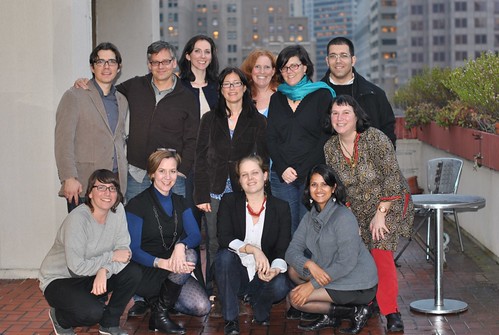SMEX spent last week in San Francisco, California, just about the center of the universe for social media. Google, Facebook, Twitter, Wikipedia, LinkedIn, and a myriad of other social media giants and upstarts all call the city or its Silicon Valley surroundings home.

We went as part of the lead-up to a new project, called E-Mediat, that will conduct basic social media training for civil society organizations in Lebanon, Jordan, Morocco, and Yemen. SMEX is collaborating with social media for social change trainer Beth Kanter and digital activism researcher Mary Joyce to deliver the initial training of trainers for the project in late February and early March in Beirut. The English-Arabic news site Meedan and TechSoup are also partners in the project, which is led by the International Institute for Education and funded by MEPI, with additional contributions from the Craigslist Foundation and Microsoft through its Global Citizenship Initiative. The project team is pictured above, courtesy of cambodia4kids (aka Beth Kanter).
Before the meetings started, we spent a full day in the offices of Creative Commons and later attended a local CC Salon at the Mountain View headquarters at LinkedIn. The topic of discussion was “what it means to be open in a data-driven world.” It was exciting—if a little disorienting—to see heart of the social media complex up close and in physical space.
One of the highlights of our trip was the Friday luncheon, attended by representatives from Twitter, Google, Creative Commons, and Craigslist (including Craig Newmark himself) who wanted to learn more about the project and social media in the Arab world.
SMEX was asked to give a short presentation about social media in the Arab world for our distinguished guests. We decided to focus not on the activism or terrorism that most Westerners probably associate these media with, but rather on their daily use and the collaborative communities that social media has helped spur, like Geekfest, Yalla Startup, and the rapidly growing number of Arab Creative Commons chapters.
That said, we’re about positive social change and challenging the status quo, so we didn’t want to ignore the political aspects either—especially as we watched our Twitter streams track the protests in Tunisia and herald the most welcome deposition of Ben Ali—and so we also not-so-humbly made some recommendations:
- That, since these companies determine in many ways how we use the Web, they should play an active role in demanding and defending freedom of expression for all.
- That we should lobby the US government to restrict US companies from selling the filtering and monitoring software that many oppressive regimes use to track and then detain bloggers and other online activists.
- Not to ghettoize the Arab world. That is, not to think of it as apart from the rest or the West but as integrated and with knowledge flowing in both directions.
- To augment efforts to increase the amount of Arabic-language content online by making it easier to use and read Arabic online. (Arabic speakers account for 65 million users and are one of the fastest growing segments of the Web.)
We had only about five minutes, and I’m sure there are more points to be made, so we encourage you to add them in the comments. Finally, since @claired from Twitter was in the room, we stole a minute more to screen a video cooked up by @sdarine and @naeema, who want to establish a communication channel with Twitter in collaboration with the Lebanese community for an enhanced Arabic Twitter experience. Watch it below and then record your own “Why I Tweet” vignette and send it to naeema [at] smex [dot] org:


